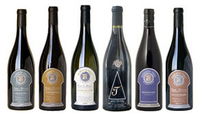Archives
September 2019
June 2019
May 2019
January 2019
August 2018
April 2018
March 2018
August 2017
May 2017
October 2016
July 2016
April 2016
October 2015
February 2015
December 2014
September 2014
July 2014
June 2014
May 2014
April 2014
October 2013
September 2013
August 2013
July 2013
June 2013
April 2013
March 2013
January 2013
December 2012
November 2012
October 2012
September 2012
August 2012
June 2012
May 2012
28 October 2016
Natural Wine Explained
 Natural wine is not new to the beverage industry by any means, but with an increase in people concerned about their health and the environment, it is beginning to become a popular choice of drink.
Natural wine is not new to the beverage industry by any means, but with an increase in people concerned about their health and the environment, it is beginning to become a popular choice of drink.The global wine industry has an estimated worth of £248bn. You’ve probably noticed this by the vast amount of choices available to you whilst browsing for a bottle in your local supermarket.
Whilst many of us will select a wine based on the enticing descriptions such as ‘zesty’, ‘fruity’ and ‘crisp’, the origin of the wine should be an important factor when selecting a brand.
What is it?
Natural wine brings wine-making back to its roots. Often, less harmful pesticides and chemicals are used within the vineyards of natural winemakers. Exposure to certain pesticides used on crops has recently been linked with an increased risk of developing cognitive disorders later on in life, such as Alzheimer’s disease.
Environmental Benefits
Natural wine is also typically guilt free! In highly-processed wines, animal products are used within the refinement process, including eggs, milk and gelatine. With the removal of such products in natural wines, this makes natural wine suitable for vegetarians and vegans, a lifestyle choice which has increased by over 360% within the past ten years.
Technological processes within the production of wine are also reduced, which in turn reduces power consumption.
Sulphites
Another fantastic benefit of natural wines is that they may help to reduce the effects of a dreaded hangover!
Congeners, which are substances within alcoholic beverages that are not the alcohol itself, can cause effects related to a hangover. Amongst these substances are sulphites. You’ve probably seen on many wine bottles that they ‘contain sulphites’. Sulphites are used as a preservative in wines, but some people can be quite badly allergic to them.
The process of natural wine eliminates sulphites, which means they are safe to drink if you are allergic, and may even reduce your chances of waking up with a headache the next morning. Grapes from natural wine are often grown sustainably and organically, which makes the wine a good choice for the environmentally conscious.
Organic wine does not always equate to low sulphates however, so it’s best to make sure that ‘low-sulphates’ is listed on the bottle.